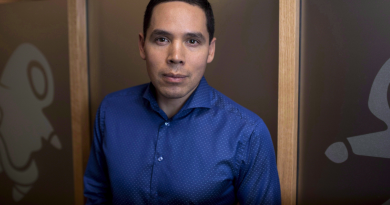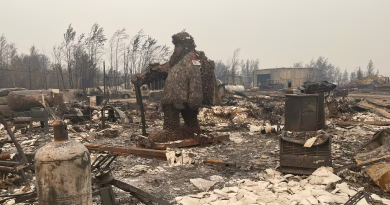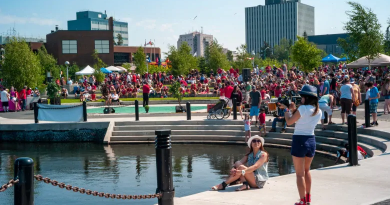Inuit describe ‘bittersweet’ experience at burial sites of lost loved ones in Southern Canada
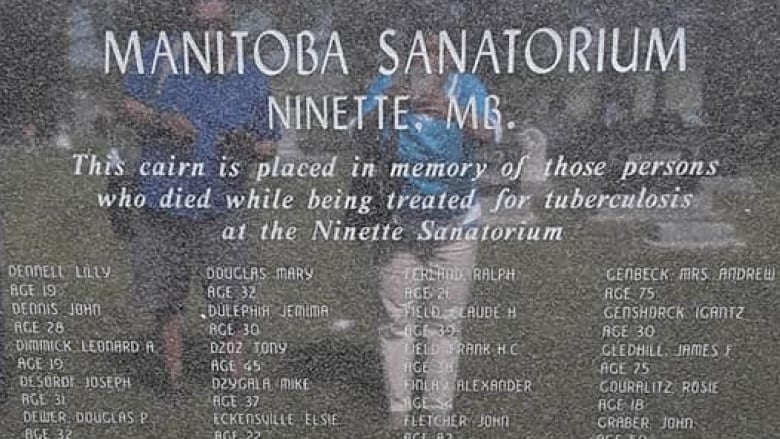
Inuit families travel to Southern Canada to discover their relatives are in unmarked graves.
For Simon Nattaq, it was a healing experience.
It took 66 years, but the Iqaluit city councillor has finally discovered what ultimately became of his grandmother, Mary Kayak, after the federal government sent her south for tuberculosis treatment in the 1950s.
Like so many other Inuit, her family never heard from her again.
Nattaq recently travelled to Belmont Hillside Cemetery in Belmont, Man., to visit his grandmother’s grave and leave an ulu for her as a gift.
“It’s like we came there with illness but walked out with a whole new life,” he said in Inuktitut.
Nattaq made the trip as part of a federally funded program called Nanilavut, or “let us find them.”
It uses a federal database to help Inuit search for gravesites of family members who went missing after they were taken from Nunavut for medical treatment.
Nattaq’s family is one of four that has gone south so far.
‘There should have been headstones’
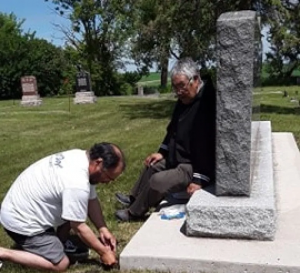
One thing Nattaq — and others — are ultimately finding through these trips is that their relatives are buried in unmarked graves.
Kayak’s name appears among dozens of others on a memorial cairn at the cemetery dedicated to Inuit who died while being treated for tuberculosis at the Manitoba Sanitorium in Ninette, Man. There is no way of knowing exactly where she is buried though.
Deborah Tagornak visited the site with Nattaq, who is her cousin. She called her family’s time at the memorial “bittersweet.”
“My grandmother’s name was on the top right [of the cairn],” she said.
“When we did find her name, we had our moment of silence, we [our] moment of gratitude, we had our moment with our grandmother’s burial site.”
Jack Anawak’s mother was also laid to rest in an unmarked grave.
“The only way we found out [about her death] was because the Roman Catholic Church had these VHF radios,” he said.
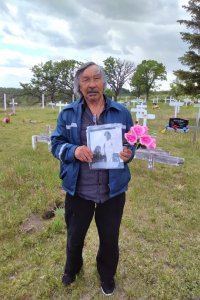
“So when my mother passed away, they informed Churchill, and they informed [the father of our church.]”
The church wasn’t able to say where his mother was buried, but the Nanilavut program found her after two days of searching.
“It was, to say the least, an Earth-shattering experience to be told, ‘This is where she is buried,'” said Anawak.
Although he doesn’t know exactly where she is, Anawak described feeling elation at knowing which cemetery she is in.
Caroline Anawak, Jack’s wife, went with him to the site.
“When we saw the seven unmarked graves, that was a travesty,” she said.
“There should have been markers, headstones. There has got to be six other people looking for [their] Inuit relatives.”
‘It’s a very meticulous job’
Joanasie Akumalik is project manager for Nanilavut, which is administered through Nunavut Tunngavik Inc.
He said his team was informed that some Inuit are buried in unmarked graves from the people who went down to find their loved ones.
Akumalik said his organization provides as much information as it can. If he can give families the location of an actual plot, he will. But sometimes all he has is the name and address of the cemetery.
Akumalik said his team has already sent four families south, and has another 17 files to go through.
He’s asking people who apply to be patient.
“There are only two of us working across the territory,” he said.
“It’s a very meticulous job trying to find a grave … We are trying to provide support as much as we can for the families.”
Written by Randi Beers, based of reporting by Jordan Konek, Salome Avva, Qavavao Peter
Related stories from around the North:
Canada: Canada’s PM apologizes to Inuit for ‘colonial’ mistreatment of tuberculosis patients, CBC News

